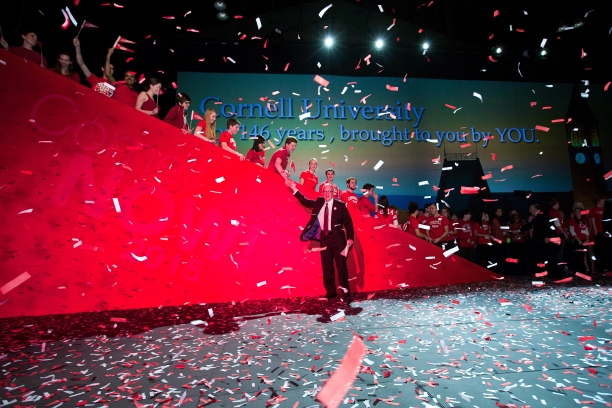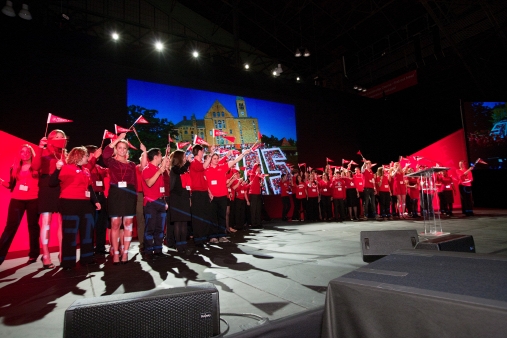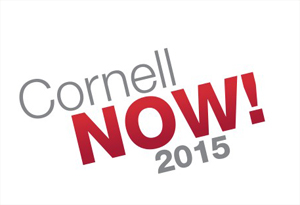CORNELL NOW – 2015
Cornell aims to fuel access, opportunity and solutions by 2015

President David Skorton prepares to lead a Barton Hall crowd in chanting "Cornell Now!" at a gala event during Trustee-Council Weekend in October.
During the second on-campus meeting of the year of the Cornell Board of Trustees Oct. 21 (a joint meeting held each fall with the Cornell University Council), President David Skorton announced an expansion of the fundraising campaign launched in 2006, citing Cornell's capacity to develop solutions to the world's most pressing challenges as well as a redoubled commitment among Cornellians to the university's founding principles in advance of the 2015 sesquicentennial.
"To realize our aspirations," Skorton said to hundreds of assembled trustees, council members, faculty and friends in Statler Auditorium, "we need the engagement, guidance, help and support of every person in this room and tens of thousands of loyal Cornellians around the country and the world."
The campaign, called "Cornell Now," seeks to raise a total of $4.75 billion in private support of the Ithaca campus and the Weill Cornell Medical College – $1.4 billion in additional gifts by December 2015.
Fully endorsed by the board of trustees, the campaign goals align with the university's strategic plan, which was developed by Provost Kent Fuchs and deans across the university. Cornell will seek the resources needed to implement key priorities. Hiring new faculty, increasing faculty diversity and nurturing current professors are top priorities, especially as senior members of the faculty near retirement. Creating graduate fellowships and scholarships for professional school students and increasing funds available for undergraduate scholarships are also among the campaign's priorities. All of Cornell's colleges, schools and units, including Weill Cornell, have set target goals in this second phase of the campaign. In addition, funds raised will be used to bolster public engagement.
"Despite the recent recession and a difficult economy, Cornell's alumni, parents and friends have given a record-breaking $3.3 billion since the campaign launched in 2006," said Charlie Phlegar, vice president for alumni affairs and development. "'Cornell Now' will build on our success and make a significant impact on the university at a critical juncture. The generosity and commitment among Cornellians is tremendous, and we have every reason to move forward with renewed confidence."
"The pride that so many of us feel about being Cornellians," Skorton said after laying out the campaign's goals, "no matter what our major or college or the path we've followed since earning our degrees; the sense that we are part of a great and noble enterprise, where ideas matter and where human society can be improved and individual lives transformed – that's Cornell's magic, and it continues to ground us, inspire us and motivate us to become the university we aspire to be, we can be, we must be and we will be."

The gala event celebrated the expansion of the campaign and featured members of Cornell's sesquicentennial Class of 2015.
Later that day, more than 700 guests gathered for dinner and a celebration program in Barton Hall. Guests included 50 members of the Class of 2015, the sesquicentennial class. At the end of the evening, Skorton led a call and response chant of "Cornell Now!" as confetti fired from hand-held air launchers fluttered thickly in the air.
"When will Cornell put forth innovative solutions to global challenges?" Skorton asked.
"Now!" replied the crowd.
Leading priorities
Faculty – $70 million for faculty renewal and diversity;
Access – $157 million for undergraduate scholarships; $100 million for graduate fellowships and professional school scholarships; $25 million for international undergraduate students;
Academic leadership – $100 million for humanities and the fine arts; $76 million for business and management sciences; $40 million for sustainable development, energy and the environment; $35 million for economics; $30 million for life sciences; $10 million for social sciences;
Cross-college connections – $5 million for Ithaca-Weill joint programs; additional goals established within Ithaca's colleges, schools and units;
Excellence in education – $56 million for excellence in education funds;
People, programs and facilities – $30 million yearly in unrestricted gifts to the Cornell Annual Fund;
Global – $10 million for international programs; and
Service – $20 million for service-learning programs and public engagement.
